October 19, 2025

The article titled "10 Key Insights on the RBT Code of Ethics for ABA Professionals" explores the fundamental ethical guidelines that Registered Behavior Technicians (RBTs) must adhere to in their practice. Understanding these ethical principles is not just important; it is essential for maintaining professionalism and accountability in the field of Applied Behavior Analysis (ABA).
Key principles such as:
stand at the forefront of ethical practice. These guidelines ensure that RBTs prioritize the needs and rights of clients, fostering trust and integrity within the therapeutic relationship. As the demand for qualified professionals in the ABA field continues to grow, it becomes increasingly vital for RBTs to embody these ethical standards.
Adhering to the RBT Code of Ethics not only enhances individual practice but also elevates the profession as a whole. Therefore, it is imperative for RBTs to commit to these ethical guidelines, ensuring their practice reflects the highest standards of professionalism.
The landscape of Applied Behavior Analysis (ABA) is evolving rapidly, marked by an increasing emphasis on ethical standards that guide practitioners in their interactions with clients. The RBT Code of Ethics serves as a crucial framework, outlining the moral responsibilities of Registered Behavior Technicians (RBTs) while emphasizing integrity, accountability, and client welfare. As the demand for ethical practice continues to grow, RBTs face the challenge of navigating the complexities of their roles. How can they effectively uphold these essential principles? This article explores ten key insights on the RBT Code of Ethics, providing valuable guidance for ABA professionals who seek to enhance their practice and foster trust in their therapeutic relationships.
The demand for certified behavior analysts has surged, with projections indicating a remarkable 25% increase in demand for Board Certified Behavior Analysts (BCBAs) by 2026. Hire ABA is a specialized recruitment platform that connects these professionals with premier job opportunities in the expanding field of Applied Behavior Analysis (ABA) therapy.
But how can you ensure that you find the right fit in this competitive landscape? Hire ABA streamlines the hiring process for both job seekers and employers through personalized job matching solutions. Our advanced job fit scoring system guarantees that candidates are matched with roles that align with their skills, preferences, and career goals. This alignment is essential in a rapidly evolving field, where successful job matching can lead to better outcomes for clients and increased job satisfaction for practitioners.
Research demonstrates that effective job matching significantly enhances outcomes for individuals, underscoring the vital role of Hire ABA. By facilitating these connections and providing comprehensive support—including personalized resume assessments—Hire ABA contributes to a more effective and responsive ABA therapy landscape. This is particularly important in regions like Maryland, where there is a growing pool of qualified behavior analysts.
Are you ready to elevate your hiring process? Trust Hire ABA to connect you with top talent in the ABA field, ensuring that you meet the rising demand with confidence.
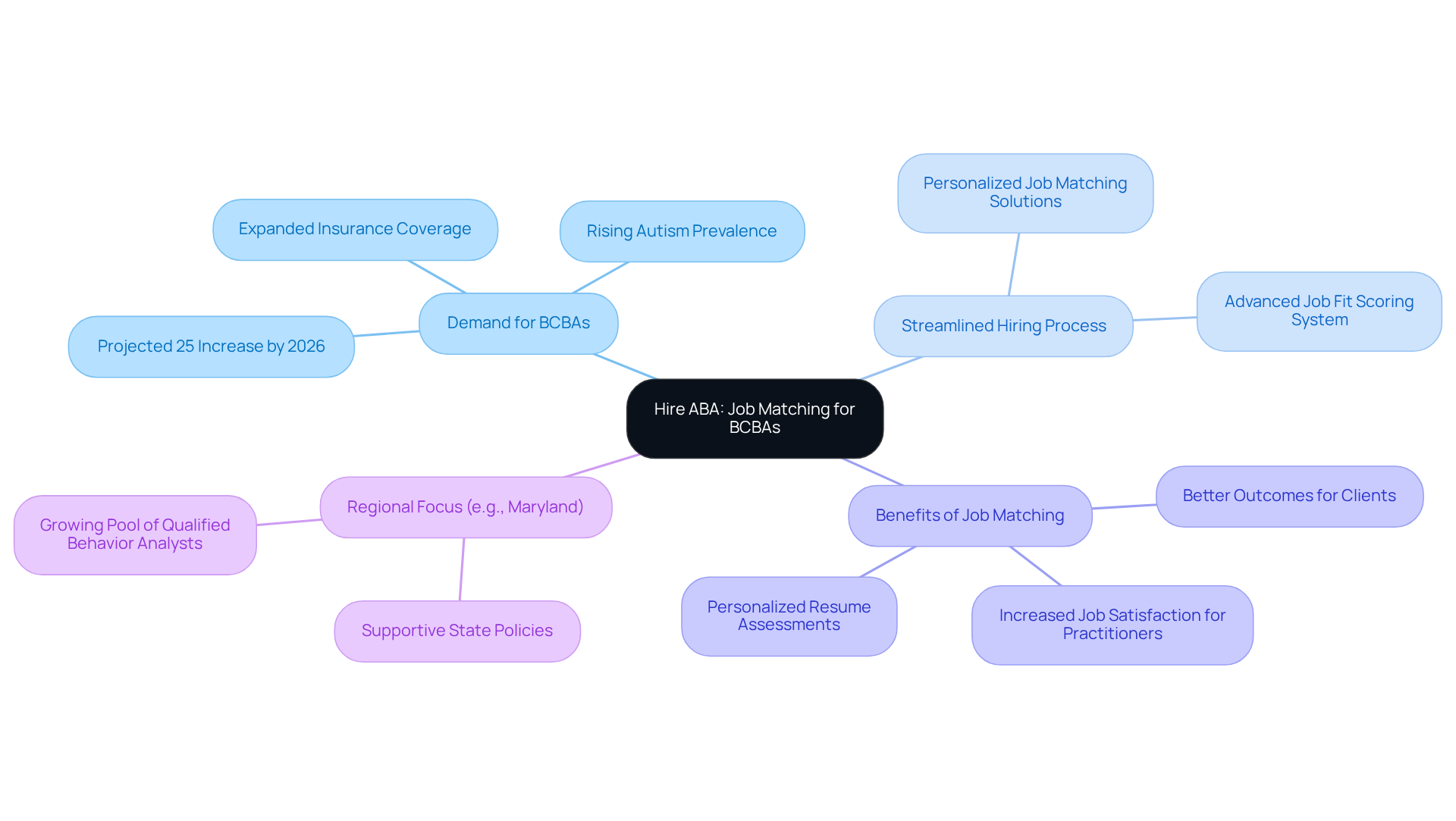
The demand for Board Certified Behavior Analysts (BCBAs) is on the rise, underscoring the critical need for a solid ethical foundation in the field of Applied Behavior Analysis (ABA). The RBT Code of Ethics serves as a fundamental document that delineates the moral obligations of Registered Behavior Technicians. It underscores the significance of integrity, professionalism, and accountability in practice. Understanding the RBT Code of Ethics is essential for RBTs, as it provides guidance for their interactions with individuals, families, and colleagues, ensuring that they maintain the highest standards of professional conduct.
This code encompasses various aspects, including client welfare, confidentiality, and the necessity of informed consent—elements that are pivotal in fostering trust and respect in therapeutic relationships. Recent updates to the RBT Code of Ethics reflect the evolving nature of moral practices in ABA therapy. For instance, these updates may introduce enhanced guidelines on oversight and responsibility, equipping behavior technicians to tackle intricate moral challenges effectively. As Nicole Sorensen, BCBA, aptly states, "The moral responsibilities outlined in the code are not merely guidelines but essential principles that underpin the integrity of the ABA field."
Consider real-world scenarios where behavior technicians can apply these moral guidelines effectively. An RBT may encounter a situation that requires weighing client confidentiality against the obligation to report suspected abuse. This illustrates the importance of informed consent and principled decision-making in practice.
Moreover, data from the US Employment Demand Report for Behavior Analysts indicates an increasing necessity for moral practices in the field, as the demand for BCBAs and Registered Behavior Technicians is projected to grow significantly in the coming years. This highlights the imperative for RBTs to be well-versed in the standards that govern their practice.
To enhance clarity, key components of the RBT Code of Ethics include:
These elements are vital for cultivating trust and respect within therapeutic relationships. As you reflect on your current hiring challenges, consider how Hire ABA can support your recruitment needs, ensuring that you engage professionals who are not only skilled but also ethically grounded.
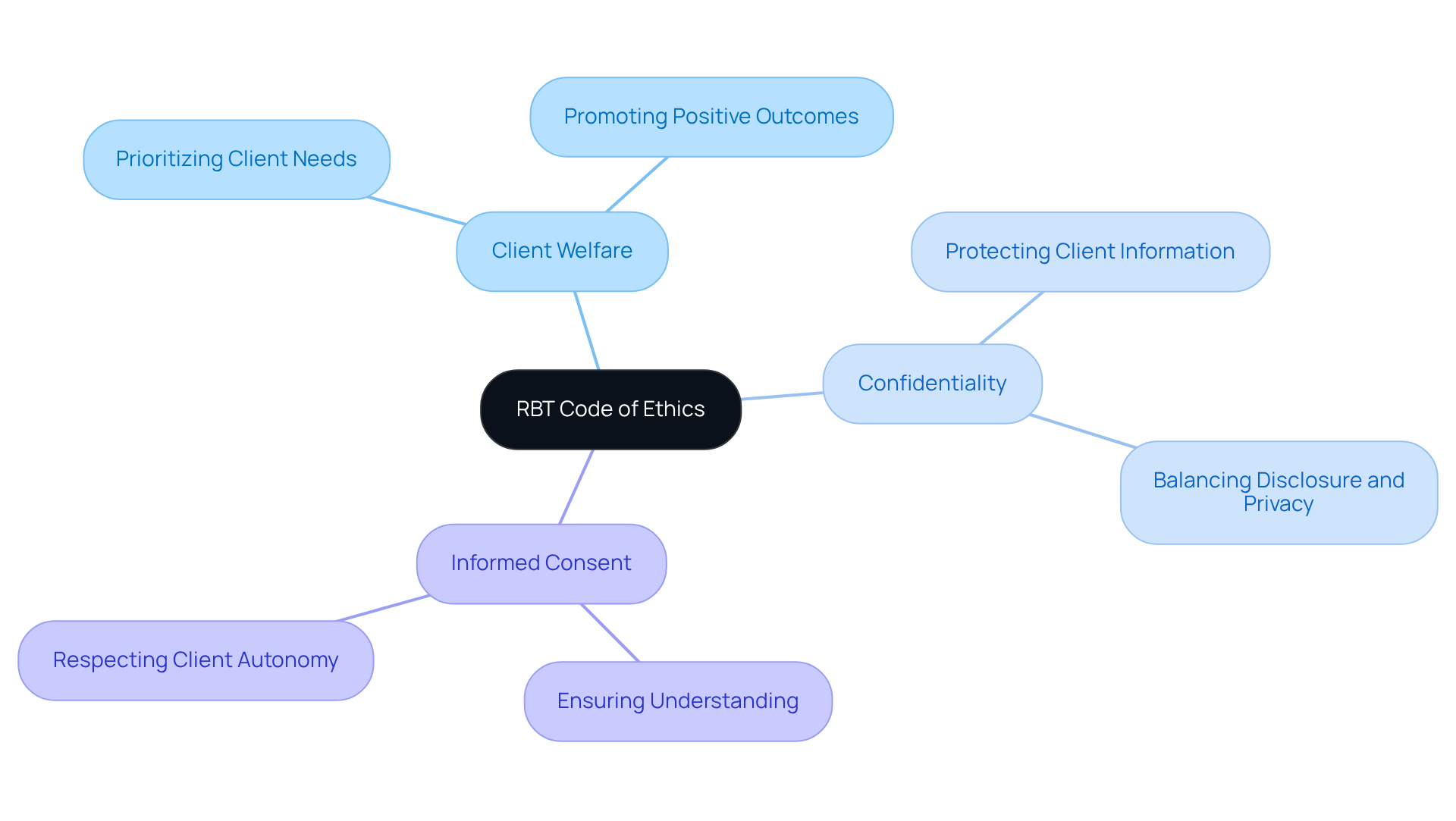
The principles that shape ethical conduct in ABA practice are anchored in the RBT code of ethics. Beneficence, which emphasizes acting in the best interest of individuals, and nonmaleficence, which focuses on avoiding harm, are paramount. These principles guide RBTs in creating a therapeutic environment that prioritizes the well-being and dignity of those receiving care.
Research indicates that effective oversight greatly enhances both supervisee growth and outcome results, with a notable 9.7% increase in goal success rates following the adoption of a hybrid model. This underscores the significance of these moral principles. By adhering to integrity—being honest and transparent—and respecting the autonomy of those they serve, professionals can navigate complex situations effectively.
As Immanuel Kant stated, "Beneficence is a duty; and he who frequently practices it...comes, at length, really to love him to whom he has done good." This adherence not only fosters trust but also leads to improved treatment outcomes, as evidenced by the positive impacts of ABA interventions on communication (d=0.30) and socialization (d=0.11) skills.
Comprehending and utilizing these principles is crucial for RBTs, as it allows them to make informed choices that align with the RBT code of ethics and ultimately benefit their clients. Moreover, failure to comply with the RBT code of ethics can result in severe repercussions, such as certification revocation and legal action, highlighting the critical nature of these moral principles.
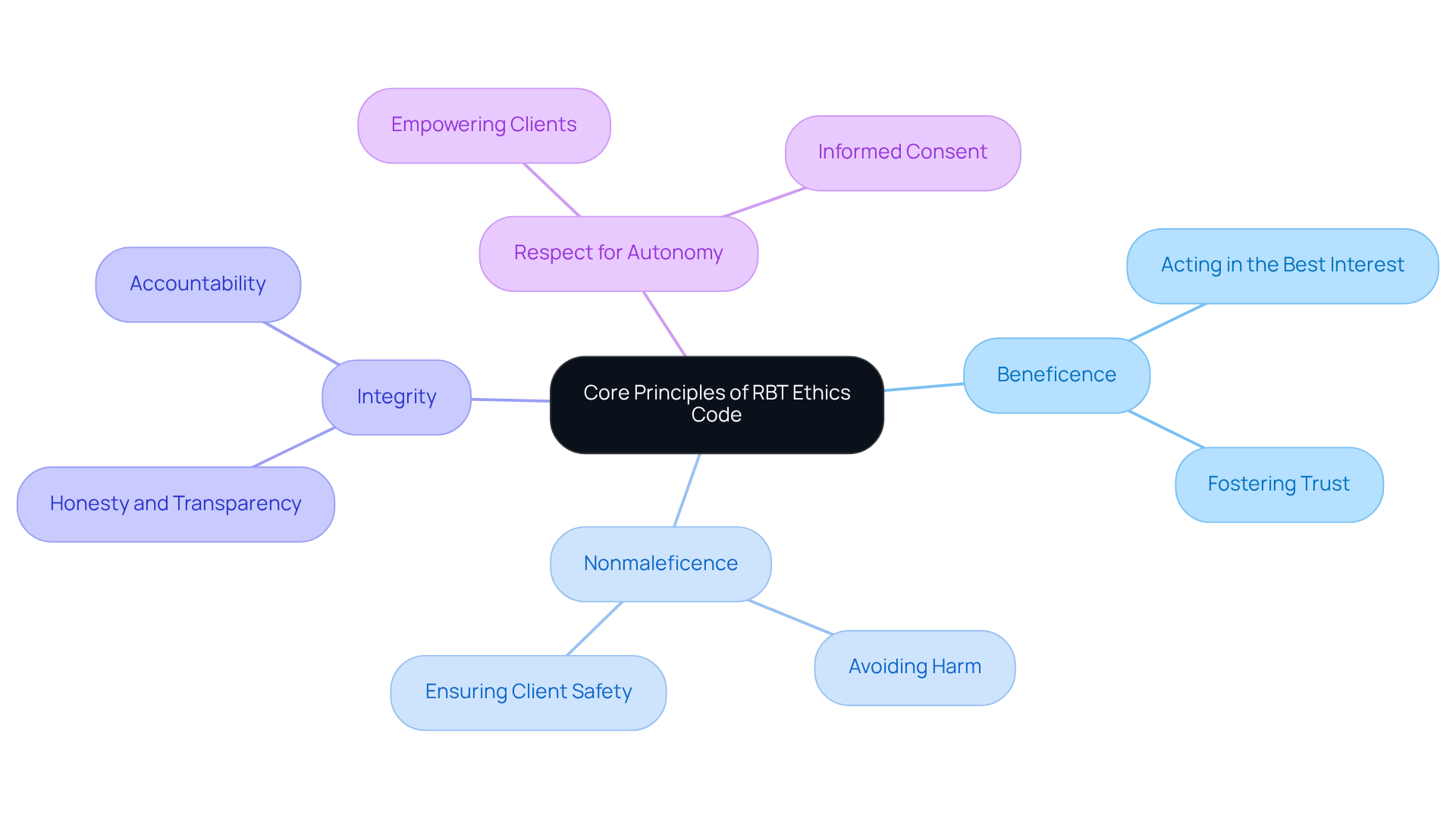
Client safety and rights are fundamental to principled practice in Applied Behavior Analysis (ABA) therapy, as outlined in the RBT code of ethics. Certified Behavior Technicians play a vital role in creating a therapeutic setting where individuals feel respected and valued. This responsibility encompasses acquiring informed consent, which is not merely a procedural formality but an essential element of principled practice that fosters trust and transparency. RBTs must ensure that individuals comprehend the goals, methods, potential risks, and expected outcomes of their treatment, empowering them to make informed choices about their care.
The six fundamental rights of individuals—privacy, confidentiality, informed consent, choice, dignity, and respect—constitute vital elements of this moral framework. Maintaining confidentiality is equally crucial, as it safeguards sensitive information and strengthens the therapeutic alliance. By actively promoting patients' rights to make choices about their treatment, registered behavior technicians not only adhere to the RBT code of ethics but also enhance the effectiveness of their interventions. This steadfast commitment to individual autonomy and dignity leads to enhanced engagement and results, ultimately benefiting both individuals and practitioners in the ABA field.
Furthermore, informed consent is a continual process that necessitates ongoing communication between RBTs and individuals, ensuring that individuals remain aware of their treatment. Collaboration with experienced colleagues also supports ethical decision-making, in line with the RBT code of ethics, reinforcing the integrity of the therapeutic process. The integration of informed consent practices into daily operations is crucial for fostering a collaborative and respectful therapeutic journey.
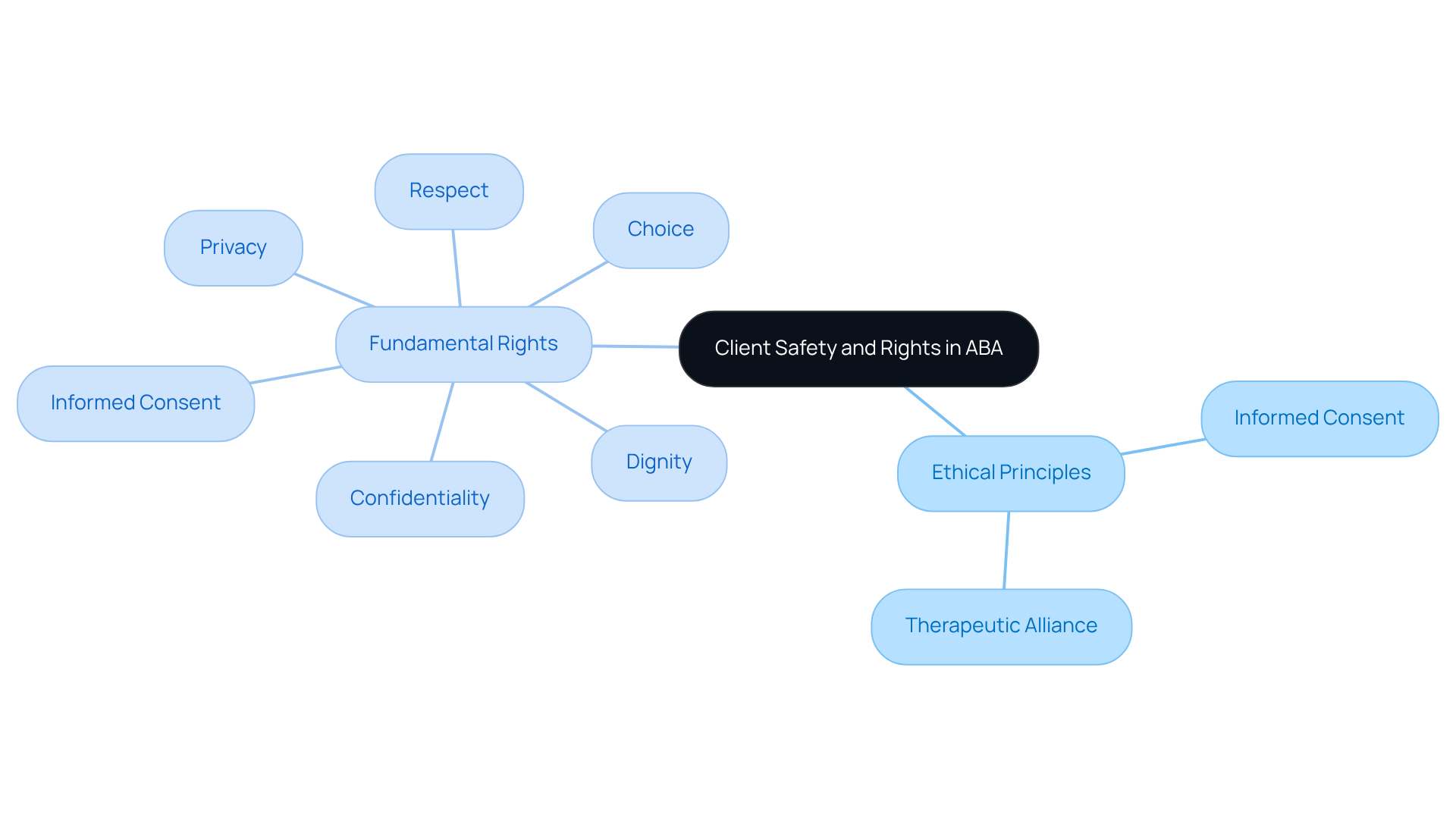
Maintaining professional boundaries is essential for protecting relationships in ABA therapy. Registered Behavior Technicians (RBTs) must clearly define their roles and responsibilities, adhering to the RBT code of ethics to ensure that interactions with individuals remain strictly professional and focused on therapeutic objectives.
By establishing and respecting these boundaries, RBTs create a secure and effective therapeutic environment, which is essential for fostering positive outcomes for those they serve. The RBT code of ethics emphasizes practitioners' responsibilities to thoroughly clarify treatment plans to individuals, reinforcing the significance of transparency and professionalism in all interactions. This commitment to moral standards not only strengthens the therapeutic relationship but also adds to consumer satisfaction.
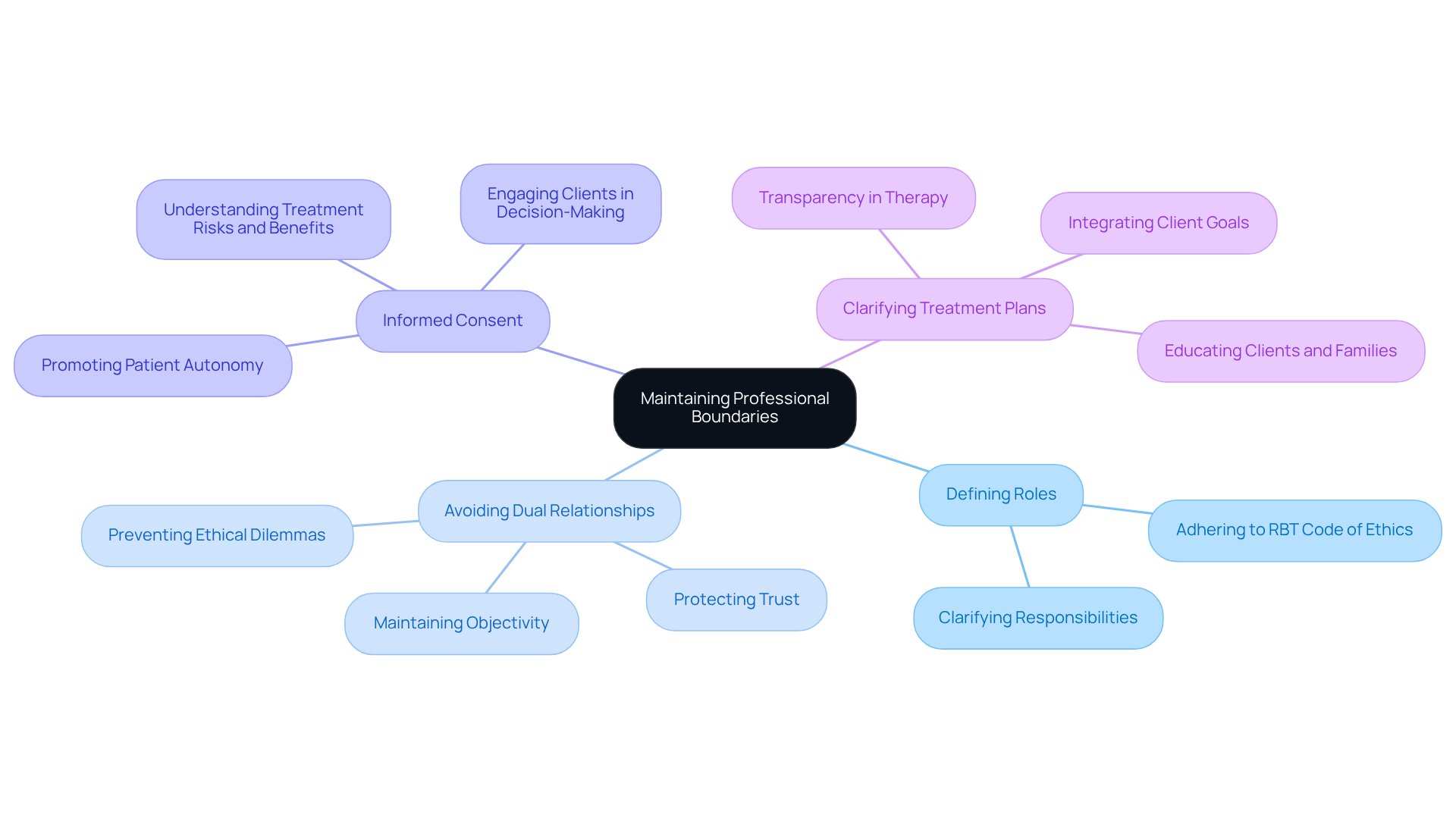
Enhancing cultural competence is not just beneficial; it is a fundamental ethical responsibility for registered behavior technicians in ABA therapy as stated in the RBT code of ethics. This critical aspect involves a profound understanding and respect for the diverse backgrounds, values, and beliefs of clients. Professionals are urged to implement culturally responsive practices tailored to meet each individual's unique needs.
Collaboration with caregivers plays a vital role in this process. By explaining treatment barriers and aligning goals with the family's cultural framework, technicians foster trust and collaboration. Moreover, maintaining transparency and open communication is essential, particularly when the RBT code of ethics and cultural competence may clash. Setting clear expectations from the outset is crucial.
By prioritizing cultural competence, therapists can ensure that treatment is both effective and respectful, ultimately promoting the best interests of the individual. This commitment aligns with the RBT code of ethics, specifically Guideline 1.02, which emphasizes providing services only within one's competence.
Consistently examining moral guidelines and engaging in open discussions with clients and caregivers can further strengthen the therapeutic relationship, leading to more significant and effective interventions. For guidance on navigating conflicts between cultural traditions and recommended interventions, behavior technicians can utilize the BACB's ethics hotline as an invaluable resource.
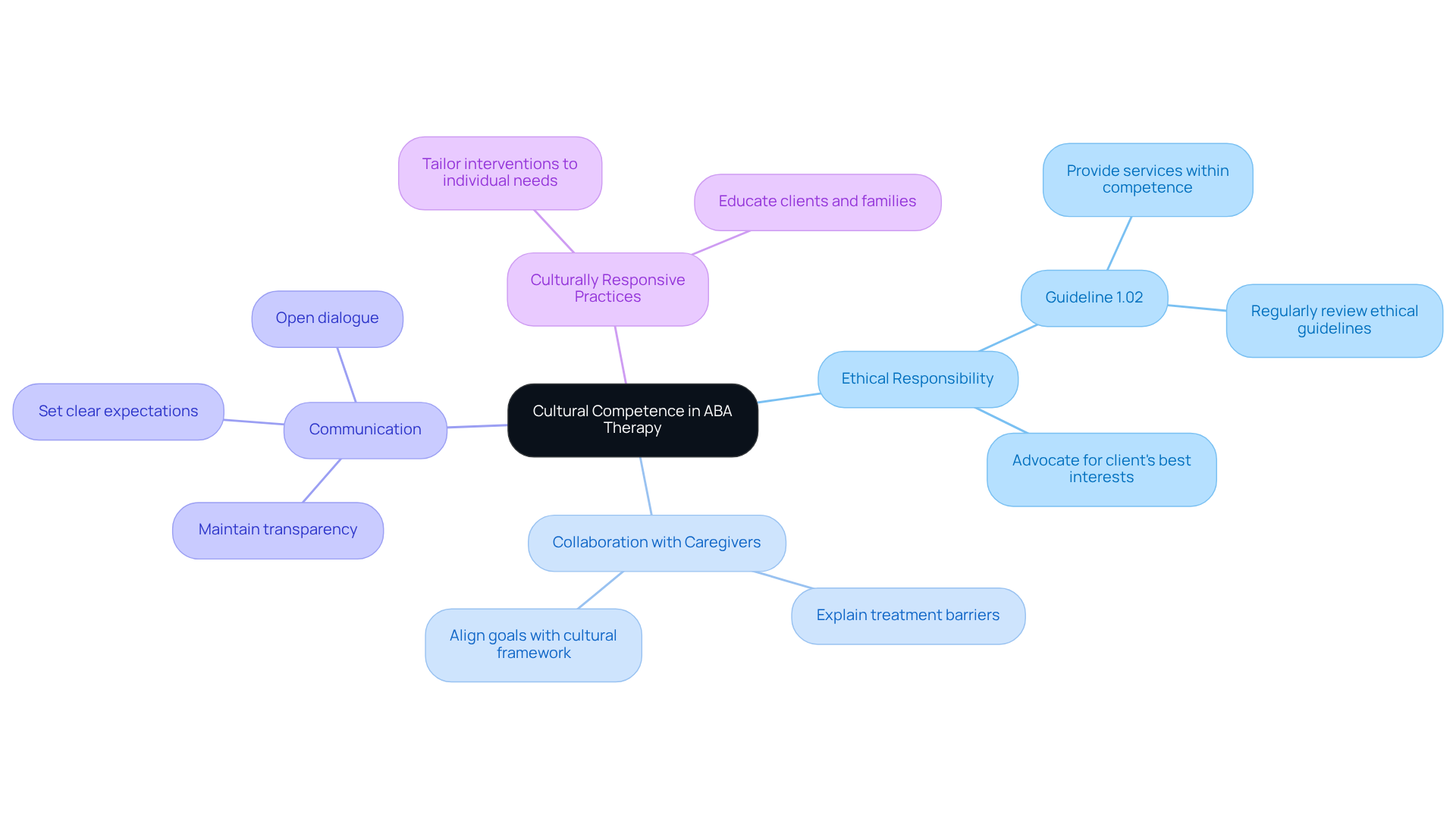
Ongoing professional growth is crucial for Registered Behavior Technicians to uphold the professional standards in Applied Behavior Analysis therapy. As the field rapidly evolves, practitioners must engage in continuous education and training to remain informed on best practices, the RBT code of ethics, and regulatory requirements. This commitment to lifelong learning not only enhances their skills and knowledge but also guarantees the delivery of high-quality care to clients. By prioritizing professional growth, behavior technicians are better equipped to navigate ethical challenges while adhering to the RBT code of ethics and contribute to the advancement of the ABA field.
Recent trends reveal that 88% of behavior analysts rely on peer-reviewed articles as their primary source of professional development, highlighting the significance of high-quality information. Additionally, the Behavior Analyst Certification Board (BACB) mandates that BCBAs and registered behavior technicians accumulate a minimum of 32 continuing education units (CEUs) every two years, including those that address the RBT code of ethics and specific requirements for supervision. Training programs for registered behavior technicians, such as those offered by Behavior Development Solutions and Relias, emphasize practical skills and adherence to the RBT code of ethics, ensuring that registered behavior technicians are well-prepared to tackle the challenges of their roles.
Engaging in these educational opportunities not only fosters professional development but also enhances the overall effectiveness of ABA therapy in meeting the needs of those served. Are you ready to elevate your practice and ensure the highest standards of care? The path to excellence in ABA begins with a commitment to ongoing education.
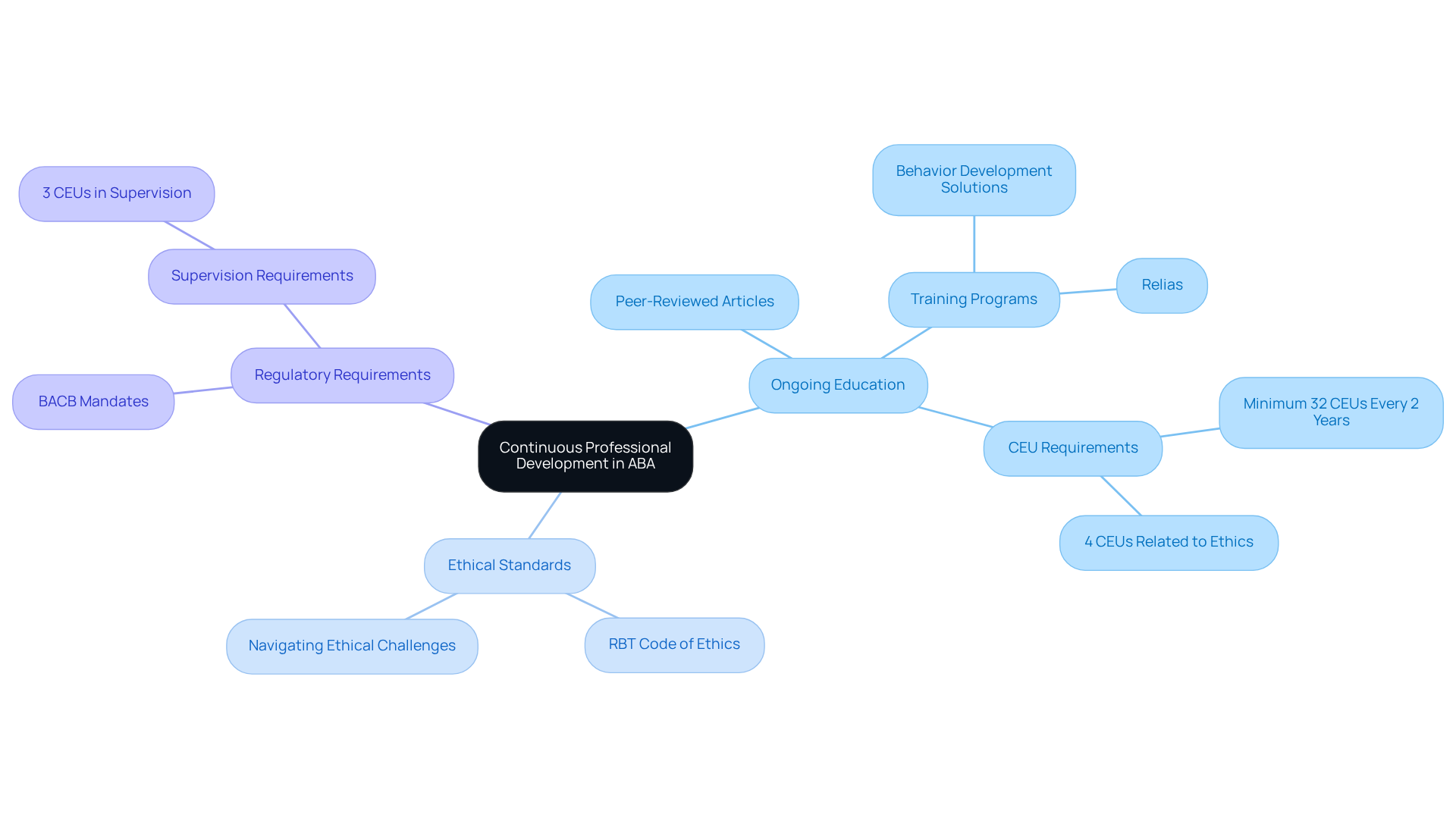
Navigating moral dilemmas is a crucial skill for Registered Behavior Technicians, as it is guided by the rbt code of ethics in the domain of Applied Behavior Analysis. These professionals frequently encounter complex scenarios that demand a profound understanding of the rbt code of ethics and an unwavering commitment to the well-being of those they serve. Critical thinking abilities are essential, enabling Registered Behavior Technicians to assess situations, weigh potential outcomes, and make informed decisions that prioritize their clients' best interests.
Effective communication is vital in these contexts, as Registered Behavior Technicians must articulate concerns and collaborate with supervisors or peers to resolve moral dilemmas. Training programs should emphasize recognizing potential moral challenges and equip technicians with strategies to address them proactively, in accordance with the rbt code of ethics. For instance, case studies illustrate that Registered Behavior Technicians often grapple with dilemmas related to dual relationships, where personal connections may jeopardize professional objectivity. In these instances, consulting with supervisors can provide clarity and guidance, ensuring adherence to professional standards.
Moreover, continuous professional development is essential for Registered Behavior Technicians to enhance their critical thinking skills. Engaging in discussions about ethical practices and analyzing real-world examples can significantly improve their capacity to navigate complex situations effectively. As highlighted in the case study on "Dual Relationships and Boundaries," professionals should decline social media requests that could blur boundaries and maintain a clear distinction between work and personal life. By fostering a culture of moral awareness and critical analysis, Registered Behavior Technicians can uphold the highest standards of practice as outlined in the rbt code of ethics while safeguarding client safety and well-being. Additionally, data-driven approaches in ABA therapy have proven to enhance accountability among caregivers and therapists, yielding tangible benefits in the lives of children with ASD. This underscores the importance of integrating principled decision-making with effective data collection practices.
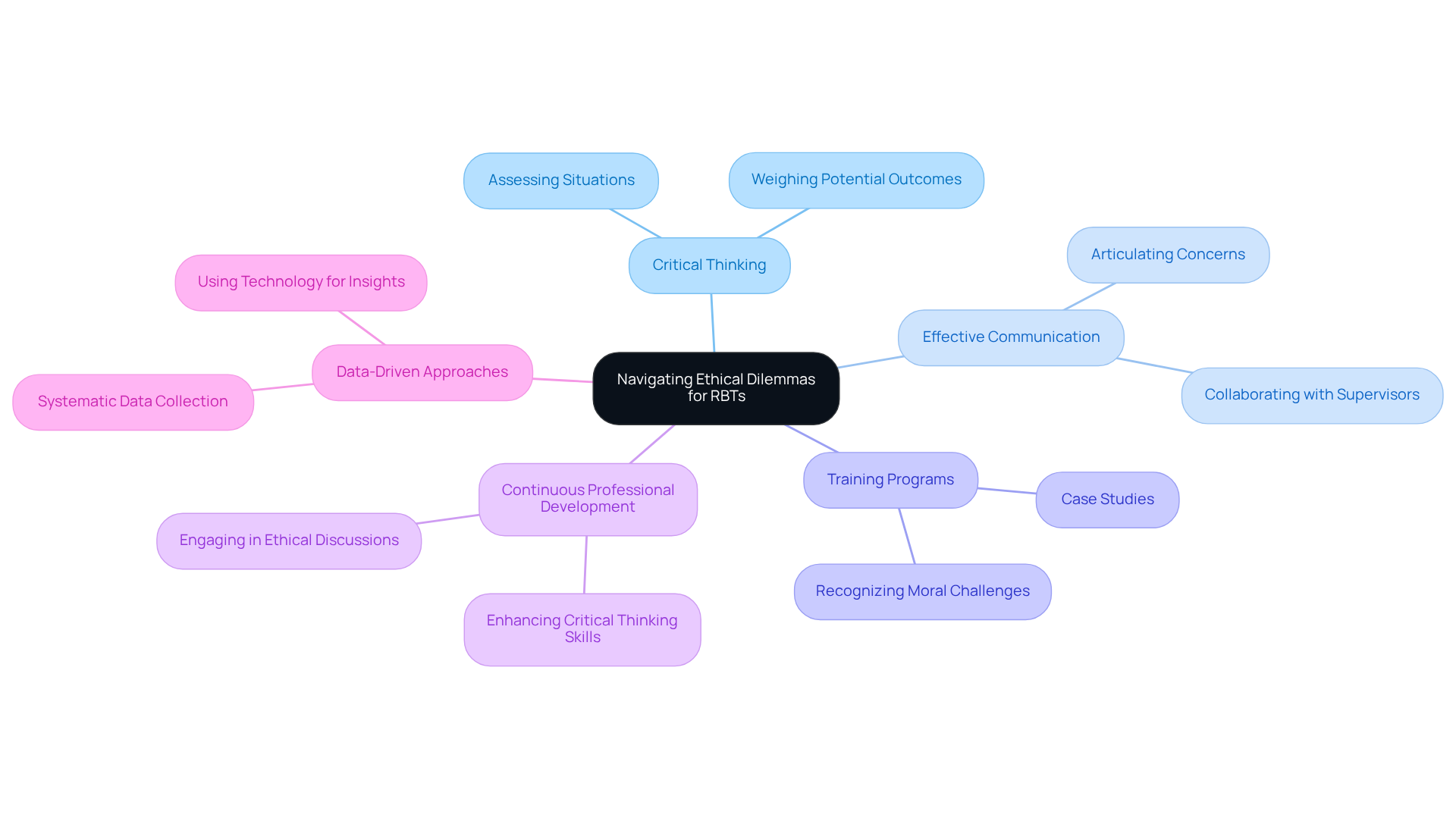
Reporting ethical violations is crucial for maintaining accountability in Applied Behavior Analysis (ABA) practice. Registered Behavior Technicians (RBTs) are obligated to report any suspected breaches of the RBT code of ethics to their supervisors or appropriate authorities. This proactive approach not only safeguards clients but also upholds the integrity of the ABA profession. Familiarity with reporting procedures is essential for RBTs, as it empowers them to address unethical behavior swiftly, thereby fostering a culture of accountability and transparency.
Effective accountability measures, such as systematic monitoring of treatment outcomes, enhance moral practices by ensuring compliance with established standards. Organizations utilizing behavior analysts adopt systematic methods to monitor sessions and assess treatment results, which guarantees compliance with guidelines and safeguards individual welfare. Furthermore, the Behavior Analyst Certification Board emphasizes that "practitioners are expected to prioritize the welfare of those they serve and strive to provide meaningful, positive outcomes." This dedication to moral responsibility not only safeguards the well-being of individuals but also enhances the therapeutic relationship, ultimately resulting in more effective interventions.
By prioritizing accountability, RBTs contribute to a professional atmosphere that values moral conduct and the dignity of individuals, in accordance with the RBT code of ethics, particularly the principles of 'Benefit Others' and 'Treat Others with Compassion.' Additionally, recognizing the historical context of ABA practices, including concerns about aversive methods, underscores the significance of present accountability measures in promoting responsible practices.
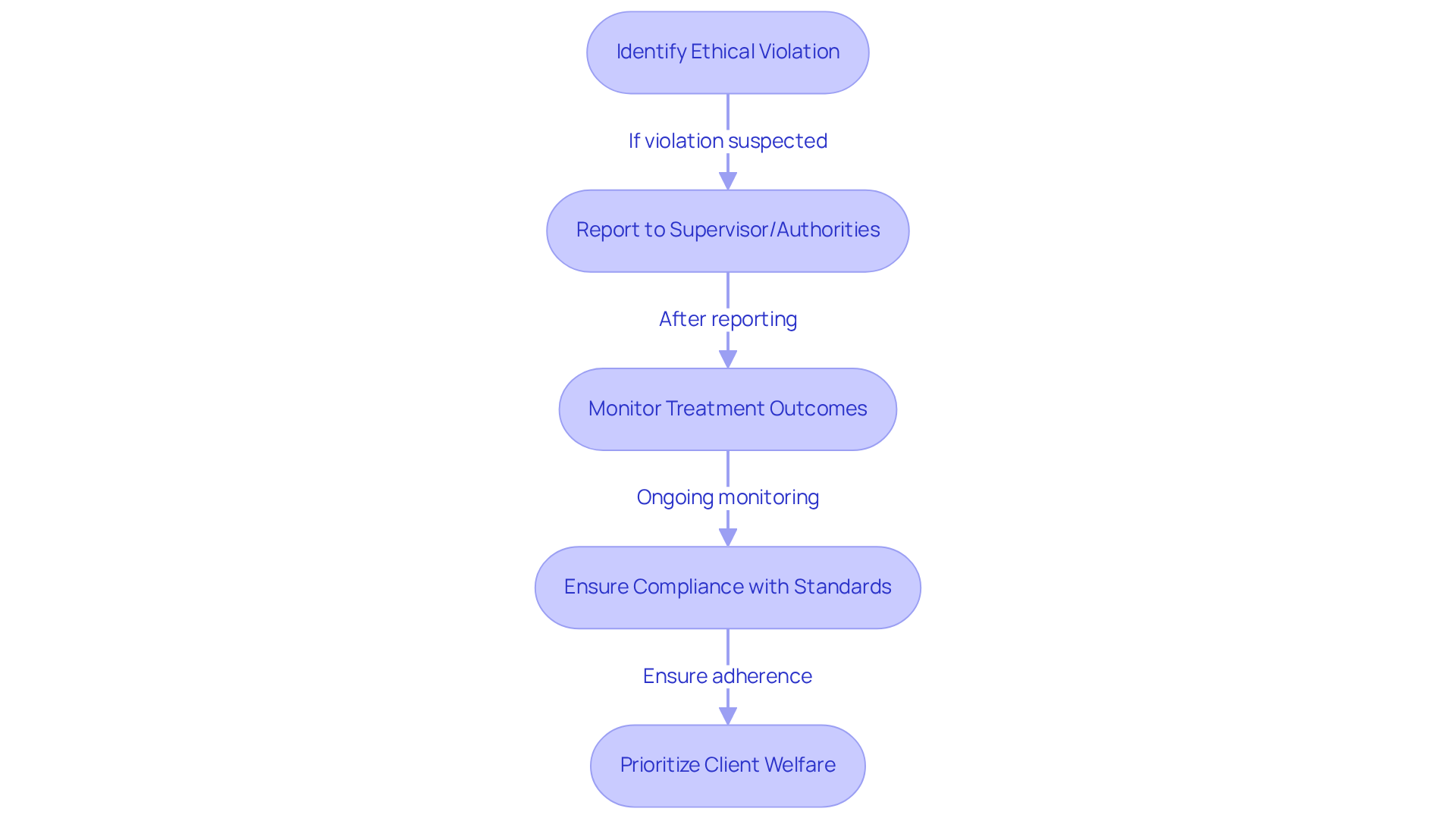
The repercussions of breaching the rbt code of ethics can be substantial, affecting both the career of the Registered Behavior Technician and the welfare of those they serve. Potential consequences include:
It is imperative for Registered Behavior Technicians to understand the seriousness of misconduct and the importance of adhering to the rbt code of ethics to protect their professional reputation and ensure the safety and rights of their clients. By committing to ethical practice, RBTs not only safeguard their careers but also contribute to the overall integrity and advancement of the ABA field.
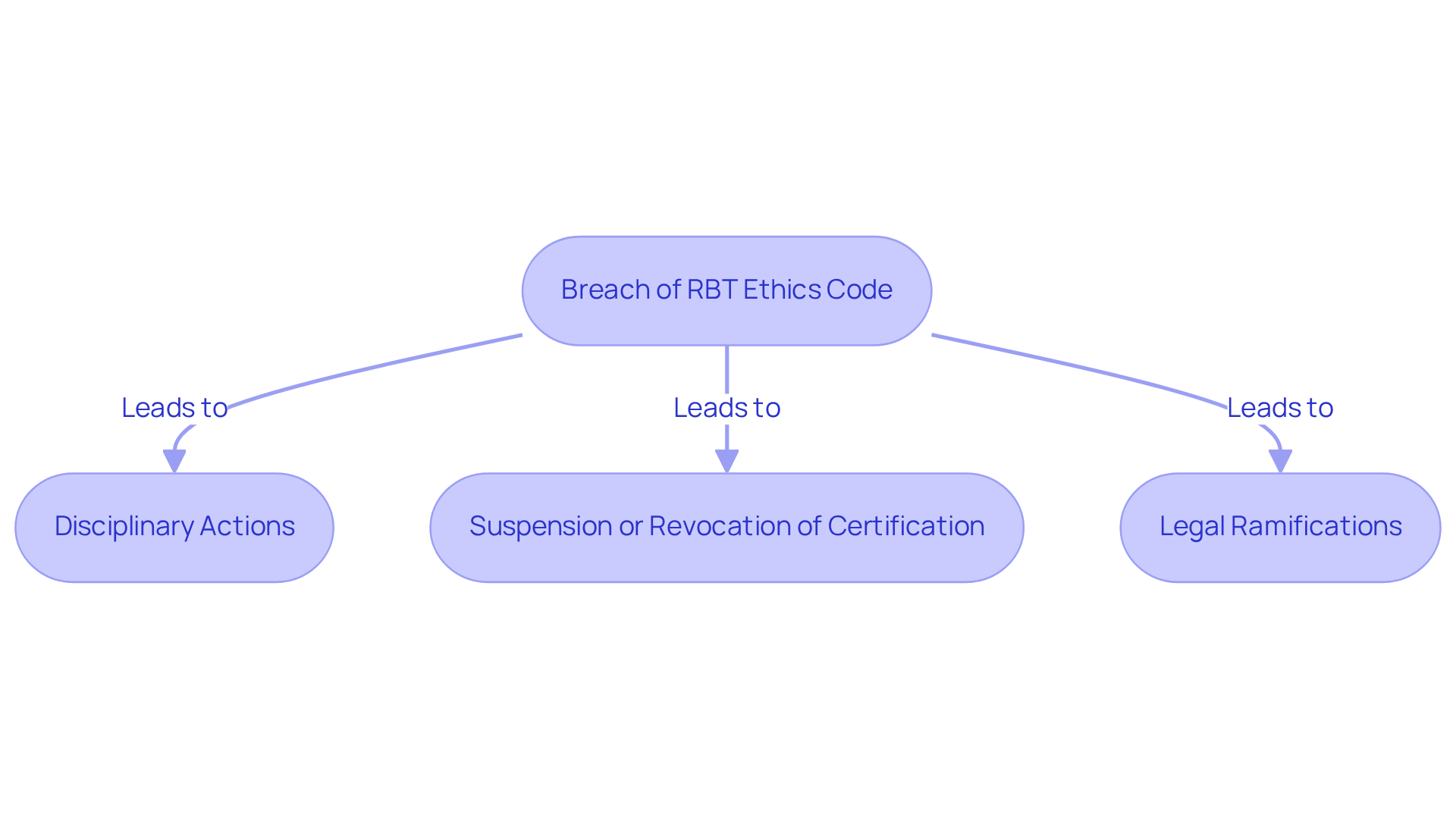
Understanding the RBT Code of Ethics is vital for all professionals in the field of Applied Behavior Analysis (ABA). This ethical framework not only guides Registered Behavior Technicians (RBTs) in their daily practice but also enhances the integrity and effectiveness of the services they provide. By adhering to the principles outlined in the RBT Code of Ethics, practitioners can ensure that they prioritize client welfare, maintain confidentiality, and uphold informed consent, ultimately fostering trust and respect in therapeutic relationships.
The article highlights several key insights regarding the RBT Code of Ethics, including:
RBTs must navigate complex ethical dilemmas with critical thinking and effective communication, ensuring that they adhere to the highest standards of ethical practice. Furthermore, the serious consequences that can arise from violating the RBT Code of Ethics underscore the need for accountability within the profession.
In conclusion, the RBT Code of Ethics serves as an essential foundation for ethical practice in ABA therapy. By committing to these principles, RBTs not only protect their professional integrity but also enhance the quality of care provided to clients. It is imperative for all ABA professionals to engage in ongoing education and actively reflect on their ethical responsibilities, ensuring that they contribute positively to the evolving landscape of behavior analysis. Embracing these ethical standards will ultimately lead to improved outcomes for clients and a more robust and respected profession.
What is Hire ABA and what does it offer?
Hire ABA is a specialized recruitment platform that connects Board Certified Behavior Analysts (BCBAs) with job opportunities in the field of Applied Behavior Analysis (ABA) therapy. It streamlines the hiring process through personalized job matching solutions.
Why is there an increasing demand for BCBAs?
The demand for certified behavior analysts is projected to increase by 25% by 2026, highlighting the growing need for professionals in the ABA therapy field.
How does Hire ABA ensure effective job matching?
Hire ABA uses an advanced job fit scoring system to match candidates with roles that align with their skills, preferences, and career goals, which is essential for achieving better outcomes for clients and job satisfaction for practitioners.
What support does Hire ABA provide to job seekers?
Hire ABA offers comprehensive support, including personalized resume assessments, to help job seekers find the right fit in the competitive job market.
What is the RBT Code of Ethics?
The RBT Code of Ethics is a fundamental document that outlines the moral obligations of Registered Behavior Technicians (RBTs), emphasizing integrity, professionalism, and accountability in their practice.
Why is understanding the RBT Code of Ethics important for RBTs?
Understanding the RBT Code of Ethics is crucial for RBTs as it guides their interactions with clients, families, and colleagues, ensuring high standards of professional conduct and fostering trust in therapeutic relationships.
What are some key components of the RBT Code of Ethics?
Key components of the RBT Code of Ethics include prioritizing client welfare, maintaining confidentiality, and obtaining informed consent.
What core principles guide ethical conduct in ABA practice?
The core principles include beneficence, which emphasizes acting in the best interest of individuals, and nonmaleficence, which focuses on avoiding harm.
What are the consequences of failing to comply with the RBT Code of Ethics?
Failure to comply with the RBT Code of Ethics can lead to severe repercussions, such as revocation of certification and potential legal action.
How can Hire ABA assist in hiring professionals who are ethically grounded?
Hire ABA can support recruitment needs by connecting employers with professionals who are skilled and knowledgeable about the ethical standards governing their practice in ABA therapy.
Our expert recruitment strategies and AI-driven sourcing ensure that you receive top-notch candidates quickly, without compromising on quality. Whether you’re looking for BCBAs, Clinical Directors, or RBTs, we’ve got you covered.